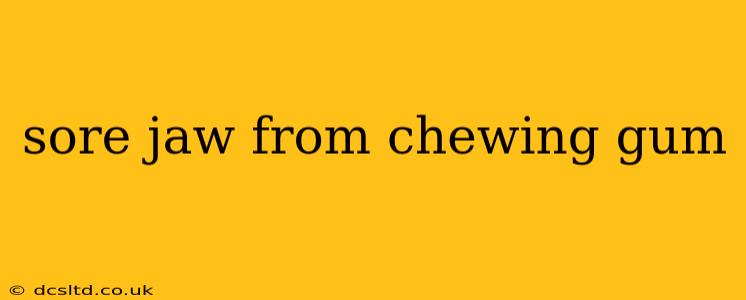Chewing gum, a seemingly innocuous habit, can sometimes lead to a surprisingly painful consequence: a sore jaw. This discomfort can range from mild aching to debilitating pain, significantly impacting daily life. Understanding the causes, prevention strategies, and treatment options is crucial for anyone experiencing this issue.
Why Does Chewing Gum Cause Jaw Pain?
The primary culprit behind gum-induced jaw pain is excessive chewing. While chewing gum can be beneficial for stimulating saliva production and promoting oral hygiene, overdoing it puts significant strain on the temporomandibular joint (TMJ), the hinge connecting your jaw to your skull. This repetitive, forceful action can lead to inflammation and pain in the TMJ, muscles, and surrounding tissues.
What are the Symptoms of Jaw Pain from Chewing Gum?
Symptoms can vary in intensity, but common signs of jaw pain from chewing gum include:
- Aching pain: A dull, persistent ache in the jaw, temples, or face.
- Sharp pain: Intense, sudden pain, often triggered by chewing or jaw movement.
- Jaw stiffness: Difficulty opening or closing your mouth fully.
- Headaches: Pain radiating from the jaw to the head.
- Earaches: Pain in one or both ears.
- Clicking or popping sounds: Noises emanating from the TMJ during jaw movement.
- Muscle tenderness: Pain or discomfort when touching the jaw muscles.
How Can I Prevent Jaw Pain from Chewing Gum?
Prevention is key. Here's how to minimize the risk of jaw pain associated with chewing gum:
- Chew less frequently: Limit your gum chewing sessions in terms of both duration and frequency.
- Chew gently: Avoid forceful or aggressive chewing. Consciously try to chew with a lighter touch.
- Choose sugar-free gum: Sugar-free gum often requires less chewing due to its softer texture.
- Take breaks: Give your jaw frequent rests between chewing sessions.
- Maintain good posture: Poor posture can strain the jaw muscles.
- Manage stress: Stress can exacerbate TMJ disorders, so incorporate stress-reducing activities into your routine.
Is it TMJ Disorder?
TMJ disorder (TMD) is a common condition affecting the temporomandibular joint. While chewing gum can exacerbate existing TMD, it's not the sole cause. If you experience persistent or severe jaw pain, it's essential to consult a dentist or doctor to rule out TMD or other underlying conditions. They can properly diagnose the issue and recommend appropriate treatment.
What Treatments are Available for Jaw Pain from Chewing Gum?
Treatment for jaw pain caused by chewing gum depends on the severity of the symptoms. Options include:
- Rest: Avoid chewing gum and other activities that aggravate the jaw pain.
- Over-the-counter pain relievers: Ibuprofen or naproxen can help reduce pain and inflammation.
- Heat or cold packs: Applying warm or cold compresses to the affected area can provide temporary relief.
- Jaw exercises: Specific exercises prescribed by a physical therapist or dentist can strengthen and relax jaw muscles.
- Mouth guards: A custom-fitted mouth guard may help protect the TMJ from further stress.
- Professional therapies: In severe cases, physical therapy, orthodontic treatment, or even surgery may be necessary.
How Long Does Jaw Pain from Chewing Gum Last?
The duration of jaw pain from chewing gum varies depending on the severity of the inflammation and the individual's response to treatment. Mild discomfort might resolve within a few days of rest, while more severe cases might require weeks or even months of treatment to fully recover.
When Should I See a Doctor About My Jaw Pain?
It's crucial to consult a doctor or dentist if your jaw pain is severe, persistent, or accompanied by other symptoms like headaches, earaches, or difficulty opening your mouth. Early diagnosis and intervention can prevent long-term complications.
By understanding the causes and implementing preventive measures, you can significantly reduce your risk of experiencing sore jaw from chewing gum and maintain a healthy jaw and overall well-being. Remember, moderation is key, and if pain persists, seeking professional help is crucial.
